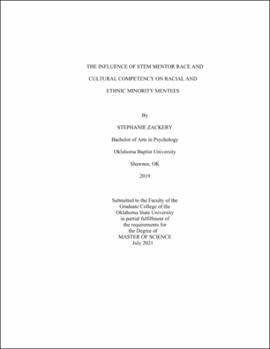| dc.description.abstract | Although the number of racial and ethnic minorities (REM) in science technology, engineering, and mathematics (STEM) fields have been gradually increasing, REM continue to be underrepresented in both STEM education and workforces (National Science Foundation, n.d.). One way to increase representation is through mentorship which is correlated with both self-efficacy and sense of belonging (Chemers et al., 2001, Choi, 2005, Feldman et al., 2010, Giblin & Lakey, 2010, Wood et al., 2015). However, discounting of their race and ethnicity by mentors can lead to lower sense of belonging (Byars-Winston, 2019, National Academies of Science, Engineering, and Medicines, 2019, Schwartz, 2016). While it may be helpful to pair students with mentors of the same race it may overwhelm existing REM STEM professionals (Byars-Winston, et al., 2019, Castellanos, et al., 2016). I examined the influence of mentors' perceived race/ethnicity and perceived cultural competency on REM STEM students in a research mentorship program (N= 99) in a south-central state on their science self-efficacy and sense of belonging in STEM. Students completed an online survey which included: a question about their mentor's race/ethnicity, an adapted Psychological Sense of School Membership Scale (Goodenow, 1993, Jackson, 2016), the Science Self-Efficacy Scale (Chemers et al., 2011), Cultural Congruity Scale (Gloria & Robinson-Kurpius) and Diversity Subscale of the Mentoring Competency Scale (Fleming et al.,2013). Students with same race mentors had higher science self-efficacy (F (1, 97) =4.75, p = .032), cultural congruity (F 1, 97) = 4.817, p = .031) and higher ratings of their mentors' competence in handling diversity (F (1, 97) = 4.751, p = .032). Participants' science self-efficacy was positively correlated with mentors' competency in handling diversity (r (97) = .0175, p = .043), cultural congruity scale scores (r (97) = .42, p = .027) and Psychological Sense of School Membership scores for the general program (r (97) = .4, p <.001) and their specific research lab (r (64) = .56, p < .001). I conclude that while having a mentor of the same race can positively influence REM students, mentees can have similar positive effects when their mentor is competent in handling diversity. | |
